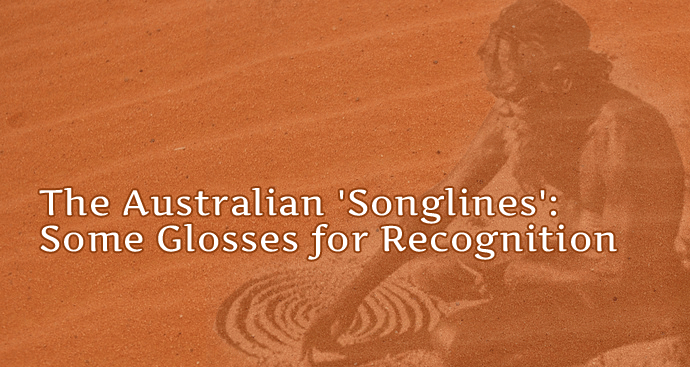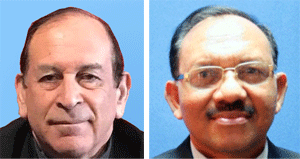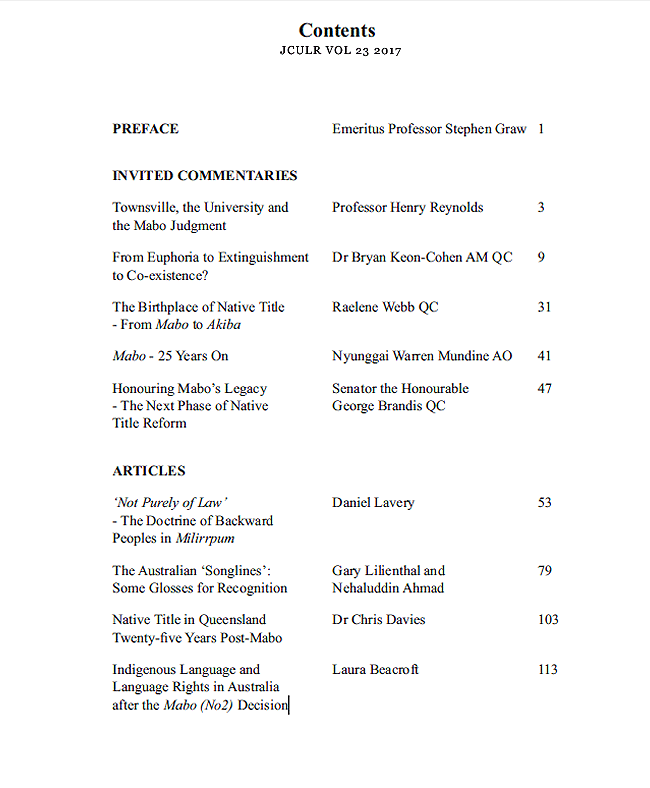Academic Paper argues that First Nations communal allodial land title cannot be extinguished by fraud

The Australian 'Songlines': Some Glosses for Recognition
By Gary Lilienthal and Nehaluddin Ahmad ![]() Academic Paper download
Academic Paper download
In Australia, successive governments have sought to extinguish 'native title', preferring English feudal socage, but not the Australian Indigenous systems of land title.
The Australian 'Songlines':
Some Glosses for Recognition

Dip Counselling, (AIPC), LLB, (Syd), Grad Dip Legal Prac, (College of Law), M Psychoanalytic
Studs, (Deakin), PhD, (Curtin). Professor of Law, School of Law, University of Gondar, Gondar,
Federal Republic of Ethopia.
Nehaluddin Ahmad
MA, LLB, LLM (Lucknow), LLM (Strathclyde), LLD (Meerut). Professor, Faculty of Law, Sultan
Sharif Ali Islamic University, Brunei.
Australian governments want courts, constituted overwhelmingly by non-indigenous lawyers, to decide land disputes as for feudal socage. Therefore, this article suggests a need to understand this attempted radical reframing of Australian Indigenous titles to land, through the convenient lens of Goffman's frame analysis.
The research question is whether Anglo-Australian frame transformation of the Indigenous land titles into mere religion, song and art, extinguishes land title.
This article tries to show that Australian indigenous land title is communal allodial title, as a bundle of subsisting rights by operation of Australian Continental Common Law, which therefore cannot be extinguished by the fraud inherent in frame transformation.
Indigenous land title is true communal allodial title, beset by a fraudulent colonial occupation, suggesting a lack of internal reason in colonial policy and administration. Successive governments have tried to frame transform the highly sophisticated and ancient indigenous legal and social system, including sophisticated celestial mapping and navigation systems, into mere religious art.
This frame transformation is reversible by epideictic rhetoric. The Indigenous system is transmitted phylogenetically, in which governance government officials can have no participation. Indigenous land title cannot be extinguished.
In Australia, successive governments have sought to extinguish what is now called at law 'native title'. Australian land title is based on the English common law land title system of feudal socage, rather than on the ancient subsisting Indigenous Australian systems of land title. This implies a severe disadvantage to holders of ancient subsisting land title.
DEFINITIONS
a feudal tenure of land involving payment of rent or other non-military service to a superior. More
plaintiff
a person who brings a case against another in a court of law.
Goffman's frame
is a set of concepts and theoretical perspectives that organize experiences and guide the actions of individuals, groups and societies - More
allodial title
is a real property ownership system where the real property is owed free and clear of any superior landlord. In this case, the owner will have an absolute title over his or her property. Property owned under allodial title is referred as allodial land.
Some realms (such as Australia and Canada) recognize Aboriginal title, a form of allodial title that does not originate from a Crown grant.
epideictic, ceremonial discourse:
speech or writing that praises or blames (someone or something)
phylogeny noun
the development or evolution of a particular group of organisms. The evolutionary history of a group of organisms, especially as depicted in a family tree
To explain socage, during the Middle Ages the villeins of England slowly changed their feudal food and labour obligations into an annual money payment, known as a quit-rent, creating a socage tenure.
The statute Quia Emptores 1290, the scarcity of labour after the Black Death, and lower values of land with the rise of trade and industry, increased the process of converting feudal dues into quit-rents, and by the 16th century quit-rents had become the norm. The one monetary conversion exception was the swearing of an oath of fealty to the lord, arguably still now in existence in the form of implied obligations of tenure. Arguably, none of this is relevant to Australia.
Australian governments want courts, constituted overwhelmingly by non-indigenous lawyers, to adjudicate the inevitable land disputes as matters of feudal socage.
This argues a very substantive shift in frame, or context, for Australian Indigenous land title, arguably without Indigenous peoples' fully informed consent. Therefore, this article suggests a need to understand this attempted reframing of Indigenous titles to land, through the convenient lens of frame analysis, and to try to uncover something useful to resolving current disadvantage.
The concept of frame analysis is derived from Erving Goffman's 1974 work. Social scientists use it to analyse how people understand situations and undertakings. Its procedures can give the practitioner the ability to re-set perspectives.
This article deals with the apparent reframing of what is essentially 'the customary laws of Indigenous Australian peoples', of the Continent of Australia, into an alternative non-Indigenous frame of the sacred, artistic, religious, and the so-called 'Dreaming'.
Ronald Berndt says Australian Indigenous peoples have their own religious traditions of the so-called dreaming and ritual systems, with an emphasis on the life transitions of adulthood and death.
Eliade states: 'There is a general belief among the Australians that the world, man, and the various animals and plants were created by certain supernatural beings who afterwards disappeared, either ascending to the sky or entering the earth'.
The Anglo-Australian legal system views the mythical narratives as mere religion and art. However, these Indigenous narratives may well serve a similar common law purpose, in Indigenous Australia, to that of the English legal and equitable maxims, in
England, namely as containing and transmitting widely accepted customary laws.
Kuypers regards frames as commanding rhetorical entities, equivalent in rhetorical force to an act of state. He describes frames as follows: '[Frames] induce us to filter our perceptions of the world in particular ways, essentially making some aspects of our multi-dimensional reality more noticeable than other aspects. They operate by making some information more salient than other information'.
Reframing the Indigenous customary law into a religion, song, or art simply allows Anglo-Australian 'churches', for example, to deploy their 'priests' to reframe the Indigenous customary laws. They can force the more recent doctrines of Christianity onto a people whose cultural systems are tens of thousands of years older.
Kuypers notes four categories of framing analysis:
- (a) frame bridging;
- (b) frame amplification;
- (c) frame extension; and,
- (d) frame transformation.
Argument in this article deploys frame transformation. Frame transformation is an apparently forced process, for use when the planned frames 'may not resonate with, and on occasion may even appear antithetical to, conventional lifestyles or rituals and extant interpretive frames'.
When this reframing is indicated, new significations are required to capture new support. Goffman named this process 'keying'.
Keying is a systematic transformation across materials, which are already meaningful according to a schema for interpretation. For keying to take place, those who participate must be aware that a systematic alteration will create a radical reconstitution. The keying must have an agreed time span.
Thus, it suggests 'activities, events, and biographies that are already meaningful from the standpoint of some primary framework transposed in terms of another framework', such that they now are seen differently.= For keying to be successful, to allow frame transformation to be stable, it must take place by informed conscious consent, or else the strength of the archaic heritage may reverse the process,= as it unravels just the same as does fraud.
By analogy, in the 1847 case of Franks v Weaver, the court teased out something of the nature of fraud. The report extracted the case as follows.
The Plaintiff invented and sold a medicine under his own name. The Defendant also made and sold a similar medicine, and on his labels, he used the Plaintiffs name and certain certificates given of the efficacy of the Plaintiffs medicine, in such an ingenious manner, as, prima facie, though not in fact, to appropriate and apply them to his own medicine. Held, that, although there were other differences in the mode of selling, the proceeding was wrongful, and the Defendant was restrained by injunction.
Lord Langdale MR held that nobody could define what fraud was, because it is so multiform. Fraud is a form rather than as a state of affairs. He stated that in the present case it consisted in the crafty= adaptation of certain words in such a manner, ordinarily and constantly, as to be calculated to make it appear to persons when he was selling the product that the thing sold was prepared by the plaintiff.= Craftiness in words arguably means knowingly arranging a secondary meaning without prior public informed consent to the usage. The Defendant's attempt at a frame transformation without informed consent, unravels into litigation.
In the 1610 case of Waggoner v Fish, the court held that strangers and foreigners devised and practised, by sinister and subtle means, ways of defrauding the charters, liberties, customs, good orders and ordinances of London. The court held that such acts were criminal fraud. Mutatis mutandis, colonial frame transformation performed on the Australian Continental Common Law, without prior informed consent, would likely be criminal fraud under the English law itself, and would therefore inevitably unravel.
The two types of frame transformation are: (a) domain-specific transformations, as in attempts to alter group status; and, (b) global interpretive frame transformation, as in attempts to change world views by conversions of thought, or complete conquest such as religious conversion. Both appear to be what the non-Indigenous majority are trying to do in Australia, by attempts at radical thought conversion of ancient land titleholders' status, and purporting to transform the frames of the land titles' underlying narratives, without the victims' prior informed consent.
From all this, the question arises as to whether Anglo-Australian frame transformation of the Indigenous land titles as mere religion and art extinguishes those Indigenous titles. This article attempts to show that Indigenous land title is characterised as communal allodial title, as a bundle of subsisting rights by operation of Indigenous customary laws, which therefore cannot be extinguished by the criminal fraud inherent in frame transformation without informed consent. The article's methodology will be to try and reframe the term 'native title' into its true meaning.
The article's structure incorporates an initial briefing on the nature of allodial land title, and its failed struggle for emergence in English land law. Then, argument progresses to a critical analysis of Indigenous underlying titles and proximate titles. After setting this scene, the article looks critically at the songlines as devices marking out a lawful system of land titles, and finally at how these songlines form chains of connection into an ancient and subsisting Indigenous Australian customary laws.
The research outcomes will strongly infer that it is most likely that Indigenous land title is true communal allodial title, arguing a fraudulent colonial occupation, and implying a lack of internal reason in colonial policy and administration.
Colonial officials have tried to frame transform the highly sophisticated and ancient Indigenous legal and social system, including sophisticated celestial mapping and navigation systems, into a gallery of mere religious art. This ancient system is transmitted phylogenetically, to which governance colonial officials can therefore have no participation. The research shows that Indigenous land title cannot be extinguished.
The research also suggests the frame transformation can be reversed by effective epideictic rhetoric.


